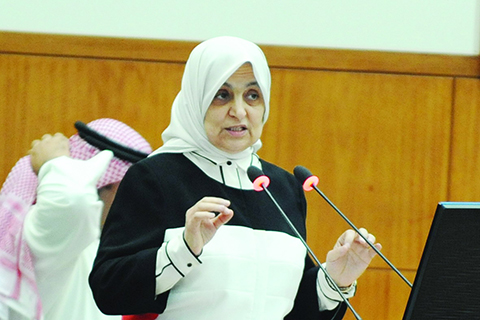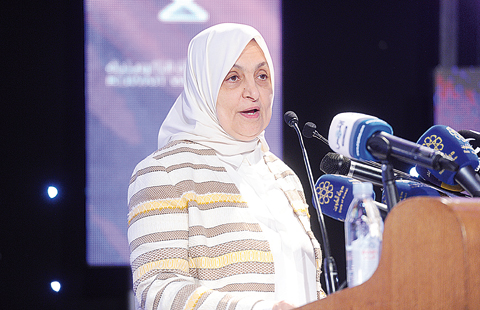 Minister Hind Al-Sabeeh
Minister Hind Al-SabeehKUWAIT: Kuwait's Minister of Social Affairs and Labor Hind Al-Sabeeh said Monday conflicts in the region prevented implementation of the 2030 Sustainable Development Goals (SDGs), especially in countries witnessing armed conflicts and least-developed nations. Sabeeh, also Minister of State for Economic Development, highlighted importance of contributions of Arab ministries and institutions to boost social-related performance in Arab countries.
Sabeeh, speaking before a meeting of Arab Social Affairs Ministers, said the role of the Arab Parliament was essential to enable the private sector and civil societies achieve development. She said the ministers would discuss terrorism and social development, eradication of poverty and protection of elderly.
Sabeeh said Kuwait was keen on promoting philanthropy and humanitarian action. The Arab ministers, added the Kuwaiti official, would pay a special attention to people with disabilities who should be fully integrated into society. Tunisian Minister of Social Affairs Mohammad Tarabulsi thanked Kuwait for hosting an international conference over the suffering of the Palestinian child. He hoped recommendations of the conference would be enforced to provide protection for the Palestinian children, who were living under the Israeli occupation.
Greater synergy
Meanwhile, Arab League Secretary General Ahmad Abul-Gheit underlined the need for greater synergy among Arab state to tackle the huge demographic, environmental, economic and social challenges facing region and contain their repercussions on people. In his inaugural speech at the session, Abul-Gheit warned that the enormous social and humanitarian backwash of the historic time of change in the Arab World are posing serious threats to societies. The Arab world is undergoing a deep and rapid change, he said. He cautioned that some of the challenges created by this situation are tantamount to real menaces to societies' security, stability and welfare. He lamented that the wave of unrest that rattled several Arab countries had a ripple effect on the region.
It has left some societies dismembered, numerous cities destroyed, millions of people displaced and states slid into bloody civil conflicts, he said. Despite these unprecedented complexities, the Arab League chief expressed confidence in the ability of Arab countries in overcoming these difficulties and moving forward to brighter future. Abul-Gheit, however, stressed that both governments and civil society had become more aware of the desperate need for real reforms.
On the terrorism threat, he pointed out that the Arab Social Affairs Council is dealing with the social aspect of the phenomenon. The council is not only interested in answering the question of how to counter terrorism but rather how terrorism did find a foothold in our societies, he suggested.
The Arab League chief also stated that the Arab League is trying to eradicate poverty through the implementation of the 2030 sustainable development plan which was ratified by the Arab leaders in their summit in Nouakchott. He reiterated the call for Arab Social Affairs Council to put in place its five-year plan and fulfill the great tasks assigned to it. He urged member states to continue their support to the Arab Fund for Economic and Social Development.
Unified vision
In the meantime, Arab Parliament Speaker Meshaal Al-Selmi emphasized the importance of agreeing on a unified Arab vision for achieving social development. In his speech, Selmi welcomed the Arab ministerial meeting follow up deliberations on the required measures to eliminate multi-dimensional poverty and achieve social development based on the ambitious plans of Arab governments. He lauded the Arab League's vision, which has much in common with the Arab Parliament's working paper, on countering poverty from legislative and humanitarian perspectives. He commended the Arab League's strategy for protecting displaced children as well as provision of medical care to elderly people.
Selmi called for increased focus on the psychological needs of elderly people, stressing that need for new legislations to guarantee decent life for this segment of the society. He reiterated the Arab Parliament's readiness to cooperate with the Arab Social Affairs Ministers Council to transform the joint Arab action and overcome challenges obstructing the development of Arab countries. - KUNA











